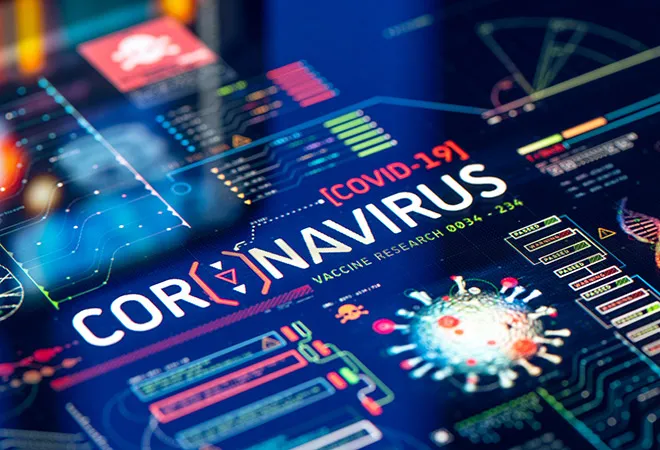Even as the world grapples with the pandemic unleashed from Wuhan, China is back to the business of great power politics — building military infrastructure, conducting naval exercises and sinking the fishing boats of other nations. While the rest of the world has come to its knees, in no small part due to China’s behaviour, Beijing is busy reaping the dividends of this global disorder.
If, at one level, it is using this coronavirus disease (Covid-19) to project itself as a global leader by supplying medical kits and expertise to nations in dire need, thereby trying to distinguish itself from an inward-focused Donald Trump administration, at another level, it is waging an information war in Europe, seeking to create internal rifts within the European Union.
It is extraordinary to witness the full play of great power politics at a time which, according to most liberal institutionalists, should have been a case study of greater global coordination. Global pandemics were widely viewed as non-traditional security threats which would lead to greater cooperation among major powers, and not as arenas of contestation among major powers for relative gains. And international institutions were supposed to help the international community navigate these security challenges.
But the state of the world today should disabuse us of all these fallacies. If anything, the fault lines between the United States (US) and China have been accentuated because of the crisis. Historically, China and the US have tried to work together to manage various global crises in the past. But not this time. Trump’s “America First” approach has meant antagonising even close allies by diverting medical supplies, outbidding the original buyers, or forcing American companies to stop exporting hospital-grade N95 masks.
The lack of leadership shown by Washington has made China a necessity for many nations even in the West which had to import faulty Chinese medical kits for lack of any alternative. While a large part of the world remains furious with China for its initial concealment of adequate information, they are forced to take Chinese help. This has allowed China to expand its influence under the garb of helping the world during this pandemic, a crisis which would have been much less severe had the country behaved responsibly initially. Europe is now pushing back strongly with French President Emmanuel Macron questioning China’s handling of the outbreak, saying things “happened that we don’t know about” and British foreign secretary Dominic Raab suggesting that “hard questions” would have to be asked about how the outbreak started “and how it couldn’t have been stopped earlier.” Yet, the ability of these nations to take on China directly remains severely limited.
As a result, the world will continue to transition to a phase where the jostling between China and the US will get exacerbated and the biggest loser will be global governance. The United Nations Security Council (UNSC) held its first session on the pandemic, some four months after the deadly contagion emerged as the biggest security challenge since World War II. After assuming the presidency of the UNSC last month, China’s Ambassador to the UN, Zhang Jun, made it clear that Beijing does not plan to discuss the pandemic situation in the Council during its presidency as there was no need to panic, even adding that the world is not far from the defeat of Covid-19 “with the coming of spring.” Washington and Beijing remain divided on the scope of the joint resolution with the US insisting that the UNSC resolution should be explicit about the origin of the virus in Wuhan, China, much to Beijing’s annoyance.
But more serious has been how the World Health Organization (WHO) has dealt with this once-in-a-lifetime crisis. Far from being the nodal agency to coordinate a global response to this pandemic, it seems to have made itself subservient to Chinese interests, losing credibility in the eyes of its other stakeholders. WHO director-general Tedros Adhanom Ghebreyesus was forced to declare an international public health emergency only at the end of January after calling it off just a week earlier under Chinese pressure. Tedros repeatedly defended China’s handling of the crisis with the WHO even tweeting in mid-January that “preliminary investigations conducted by the Chinese authorities have found no clear evidence of human-to-human transmission”.
Tedros suggested at the end of January that “WHO doesn’t recommend limiting trade and movement”. This has generated an intense backlash in Washington which is WHO’s largest single funder with President Trump not only accusing the UN agency of being “very China-centric” but also following it up by halting US funding “while a review is conducted to assess the World Health Organization’s role in severely mismanaging and covering up the spread of the coronavirus.” Though Trump’s move to cut funding has led to political bickering in the US, senior members of the US Congress have also called for a Congressional investigation into the WHO’s handling of the crisis, ostensibly in cahoots with the Chinese Communist Party (CCP).
Great power politics has continued unabated even when many expected greater global solidarity. The international order was getting fragmented and major power rivalry was beginning to shape the global contours before the present crisis. That process has been galvanised by the Covid-19 crisis. Where on the one hand, the CCP stands exposed for its shenanigans during the pandemic, the vulnerabilities of the US and the West in general too are out in the open.
Nations like India should be prepared to navigate the externalities of this challenging environment.
This commentary originally appeared in Hindustan Times.
The views expressed above belong to the author(s). ORF research and analyses now available on Telegram! Click here to access our curated content — blogs, longforms and interviews.




 PREV
PREV


